Download
Roundup – September 2012/2
Brian Wilson
The previous Roundup, September 2012/1 is here.
Some months ago I embarked on a survey of the Haydn Symphonies
as performed by the Austro-Hungarian Orchestra on Nimbus, fully
intending to cover one volume per month. So far I’ve managed
only the first volume and been side-tracked by the wealth of
other new and back-catalogue recordings that have come my way.
Mea culpa – I’ll try to catch up again next
month.
Recording of the
Month: Download and Blu-ray
Gustav MAHLER (1860-1911)
Symphony No.1 in D: Titan (1889)
Budapest Festival Orchestra/Iván Fischer – rec.
September 2011. DDD/DSD
Pdf booklet included.
CHANNEL CLASSICS CCSSA33112 [55:45] – from channelclassics.com
– SACD and mp3, 24/44.1, 24/96, 24/192 and 2– and
5-channel DSD downloads
Sergei PROKOFIEV (1891-1953) Piano
Concerto No.3 in C, Op.26 [29:52]
Gustav MAHLER (1860-1911) Symphony
No.1 in D: Titan (1889) [57:48]
Yuja Wang (piano)
Lucerne Festival Orchestra/Claudio Abbado – rec. live,
August 2009. DSD
HD 1080i 16:9 ratio PCM stereo and DTS 5.1 surround. All regions.
EUROARTS Blu-ray 2057694 [79 minutes]
[also DVD 2057698]
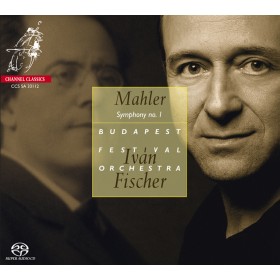
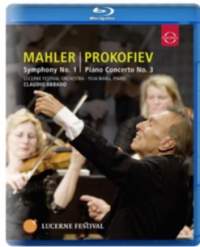 These
two recent recordings of this symphony have come to challenge
the classic Rafael Kubelík (DG Originals 449 7352)
version in my affection. Both of the new versions take more
liberties than Kubelík with rubato. Whereas I
was mildly disturbed at first by this aspect of Iván
Fischer’s Mahler Fourth – a view which I modified
considerably on repeated hearing – I was not troubled on
hearing either version of the First; in fact, I didn’t
even notice it on first hearing in either case.
These
two recent recordings of this symphony have come to challenge
the classic Rafael Kubelík (DG Originals 449 7352)
version in my affection. Both of the new versions take more
liberties than Kubelík with rubato. Whereas I
was mildly disturbed at first by this aspect of Iván
Fischer’s Mahler Fourth – a view which I modified
considerably on repeated hearing – I was not troubled on
hearing either version of the First; in fact, I didn’t
even notice it on first hearing in either case.
Iván Fischer opens the first movement with great delicacy
as if Nature herself were setting the pace and the recording
allows us to savour that delicacy, especially in 24/96 mode.
Later, however, as everything bursts fully into life at the
end of the movement, natura naturans, there’s plenty
of power where it’s needed. My only minor caveat is that
the wide range and the extreme delicacy of some of the softer
passages would preclude playing this recording at a comfortable
level in the car; listen at the right level for when things
get going and the softer passages will get lost unless you have
a very quiet limousine. Heard on a good domestic system this
wide range has the advantage of compelling attention; I often
start to type my initial responses to a recording even as I’m
listening to it, but that seems almost sacrilege in this case.
While on the subject of the recording I should mention that
I had some difficulty at first in downloading the 24/96 version
– something on my computer was limiting the download to
a very slow speed, for reasons which I haven’t yet fathomed
– so I downloaded the 24/44.1 version, which came down
the line much more quickly. Both sound good, but the 24/96,as
expected, has the edge.
Both Iván Fischer and Claudio Abbado come to this symphony
with their Mahler credentials well established*. They are both
a little more measured than Kubelík throughout, except
in the third movement where Fischer is only a fraction slower
than Kubelík, but it’s a measure of the expertise
of all three that all their tempi sound exactly right in context.
Both make the first movement truly ‘Spring without end’
in a way that brought to mind both the bright colours and the
subtlety of the original animation of the cleaned up Blu-ray
version of Walt Disney’s Bambi.
In the remaining movements, too, both of the newer recordings
held me in thrall just as much as Kubelík. By the end
of the tumultuous finale the wild applause that greets Abbado
is fully merited, but I’m sure that the other two recording
are equally deserving of a similar accolade. With performances
such as these, it seems incredible that the original performance
of the symphony was such a failure, but that’s partly because
Mahler has done more than any other composer to re-educate us
in the way in which we listen to music.
What Fischer and Abbado have in common is their ability to bring
out the degree to which this symphony is based on the sounds
of Nature and of birdsong in particular, especially in the first
movement. It’s not that you wouldn’t realise that
from Kubelík and it’s inherent in the marking in
the score, Wie ein Naturlaut, ‘like a sound of nature’,
but it becomes inescapable in these two versions.
DG’s 1967 recording has worn exceptionally well –
in some respects my caveat about the wide dynamic range of the
Channel Classics version also applies here – but the sound
of the Euroarts Blu-ray played on the Cambridge Audio 650BD
that’s linked to my audio system – I haven’t
heard the DVD equivalent – and the 24-bit versions of the
Channel Classics obviously have an edge on it, with the 24/96
bringing a subtle but welcome extra degree of realism over the
24/44.1 of the latter. Audio-only is my preferred method of
enjoying the Abbado, only partly because the Cambridge is the
better of my Blu-ray players, but the camera-work is a model
of its kind: none of the up-the-flautist’s-nose shots,
but directing us to significant instrumental contributions.
DG couple Kubelík’s recording very appropriately
with Dietrich Fischer-Dieskau in Lieder eines fahrenden Gesellen,
which makes it better value than the Channel Classics, which
has no coupling. At £4.99 in 320 kb/s mp3 from hmvdigital.com,
it can be yours for the price that I paid for its earlier CD
incarnation on the short-lived DG Privilege label. I can’t
see much reason to pay £8.99 for the lossless download
from deutschegrammophon.com, when the CD can be yours for less,
even from their own mail order shop.
Bargain hunters in search of the First and Third symphonies
together could do much worse than consider the 2-CD Decca Eloquence
set with Zubin Mehta and the Israel and Los Angeles Philharmonic
Orchestras respectively (480 1133). The First sounds
more matter-of-fact than from Kubelík, Fischer or Abbado,
and at around £11-12, it’s a little more expensive
now than when I reviewed it – here
– but it’s still good value.
If you just want an mp3 version, the Fischer recording can be
yours for as little as £1.68 from emusic.com. The bit-rate
is unlikely to be impressive – their transfer of the Fourth
which I tried falls well below even 102 kb/s – and though
you may think the result not too bad, my experience with re-hearing
that recording in Channel Classics’s 24-bit version made
me rethink my attitude to the performance fairly radically.
Channel’s own downloads are all charged at reasonable rates:
from mp3 at £7.12 via 24/44.1 at £11.10 and 24/96
at £13.47 to 24/192 at £15.85. The 2– and 5.1-channel
DSDs cost £23.78.
It’s a little naughty of Euroarts to claim ‘Running
Time 93 minutes’; it’s more like 79 minutes, but the
Prokofiev makes a welcome if unspectacular bonus. Theirs is
the most expensive way to obtain the music and you may well
wish to see the performance only once before reverting to just
hearing it, but the sound and picture are both excellent in
Blu-ray format. The DVD costs around £24 and the blu-ray
around £28.
Abbado’s Mahler is well represented on CD and on DVD/Blu-ray
and Fischer has given us the Second (23506), Fourth (26109)
and Sixth (22905). May we hope that he now completes
the series?
Those looking for the original 1893 5-movement version of Mahler’s
First, with the rejected Blumine in its proper place, not just
as an appendix, will be well served by either Jan Willem de
Vriend (Challenge Classics CC72355) or Alexander Joel
(Coviello COV31002) - see June 2010 Roundup.
The passionato.com download of the Joel recording no longer
applies but you'll find it in mp3 and lossless from eclassical.com.
* see my review of Fischer’s recording of the Fourth Symphony
in the November 2011/1 Roundup.
Joint Download
of the Month
George Frideric HANDEL (1685-1759)
Saul (1739)
Saul – Christopher Purves (bass)
David – Sarah Connolly (mezzo)
Jonathan – Robert Murray (tenor)
Merab – Elizabeth Atherton (soprano)
Michal – Joélle Harvey (soprano)
High Priest – Mark Dobell (tenor)
Witch of Endor – Jeremy Budd (tenor)
Ghost of Samuel – Stuart Young (bass)
Abner – Eamonn Dougan (baritone)
Doeg – Ben Davies (bass)
Amalekite – Tom Raskin (tenor)
The Sixteen/Harry Christophers
Pdf booklet with text included
CORO COR16103 [2:42:39] – from thesixteendigital.com
(mp3, aac, 24/96 alac and 24/96 flac) or stream from Naxos Music
Library
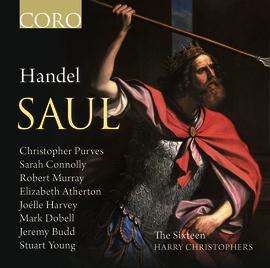 I’m
pleased to see Coro’s recordings with The Sixteen becoming
available now as downloads almost simultaneously with their
availability on disc.
I’m
pleased to see Coro’s recordings with The Sixteen becoming
available now as downloads almost simultaneously with their
availability on disc.
The new recording has some formidable predecessors from Messrs
Gardiner (Philips) and McCreesh (DG) but Harry Christophers’
stylish performance of the overture soon convinced me that there
was no need to disinter either of these from their cabinet for
comparison: the worth of the new version can safely stand on
its own without the need to compare, especially as it alone
is available in 24/96 format (flac or alac). Everything seems
so right here that detailed analysis is superfluous. I’d
already decided to make the two Mahler recordings my choice
for the month and I don’t normally like to nominate two
– it makes it all the more difficult to choose my six recordings
of the year, for one thing – but I can’t pass over
this new Saul.
The new download is also competitive in price terms with either
of its rivals: mp3 and aac at £14.50 are less expensive
than deutschegrammophon.com’s £16.49 for McCreesh
in mp3 and £24.99 (flac or alac) not much more for superior
24/96 than deutschegrammophon.com’s £19.99 for 16-bit
flac. (The deutschegrammophon.com price of £12.49 (mp3)
and £14.99 (flac) for the Gardiner, on the other hand,
is a real bargain; there’s no libretto but you’ll
find one online here.)
Discovery of the
Month
Christopher GIBBONS (1615-1676)
Motets, Anthems, Fantasias and Voluntaries
Not unto us, O Lord [4:58]
Voluntarie in C [4:09]
Above the stars my Saviour dwells [6:29]
Fantasy-Suite in d minor [6:57]
Ah, my soul, why so dismayed? [2:38]
Organ Voluntary in C [2:22]
O bone Jesu [3:26]
A Voluntary for ye Duble Organ in a minor [5:40]
Fantasia [4:37]
The Lord said unto my lord [5:02]
Verse for the Double Organn in d minor [4:20]
Fantasy-suite in F [11:49]
Philippa Hyde (soprano), Jacqueline Connell (mezzo), Charmian
Bedford (soprano), Richard Latham (bass), Alastair Ross (organ)
Choir of the Academy of Ancient Music; Academy of Ancient Music/Richard
Egarr (organ, conductor)
rec. All Hallows Church, Gospel Oak, London, November 2010.
DDD/DSD.
¼ comma meantone tuning.
Booklet with English and Latin texts, French and German translations
included.
HARMONIA MUNDI HMU807551 [62:27] – from classicsonline.com
(mp3)
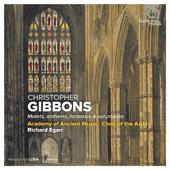 A
more detailed review of this recording, in hybrid SACD format,
is due to appear on the main MusicWeb pages as my Recording
of the Month. The music of Christopher Gibbons has hitherto
been a largely unknown quantity apart from odd recordings of
individual works in anthologies and the semi-masque Cupid
and Death which he co-wrote with Matthew Locke, but this
new album from the AAM and Richard Egarr, the latter a fan of
the music since he discovered an elderly dissertation on it,
reveals him to be as worthy of attention as his more famous
father Orlando, himself no mean composer. The solo singing may
not be quite out of the top drawer but that’s no more than
a minor drawback in the case of a revelatory release.
A
more detailed review of this recording, in hybrid SACD format,
is due to appear on the main MusicWeb pages as my Recording
of the Month. The music of Christopher Gibbons has hitherto
been a largely unknown quantity apart from odd recordings of
individual works in anthologies and the semi-masque Cupid
and Death which he co-wrote with Matthew Locke, but this
new album from the AAM and Richard Egarr, the latter a fan of
the music since he discovered an elderly dissertation on it,
reveals him to be as worthy of attention as his more famous
father Orlando, himself no mean composer. The solo singing may
not be quite out of the top drawer but that’s no more than
a minor drawback in the case of a revelatory release.
The download comes complete with the booklet, itself an elaborate
affair which will be difficult to print out – it’s
too large to fit into a jewel case, so it comes as a separate
entity with the disc in a cardboard cover. I haven’t heard
the download but the availability of an SACD layer with the
physical disc – a subtle but noticeable improvement on
the CD layer – means that you may wish to spend a little
extra on this occasion; I’ve seen the SACD on sale for
£11 – or less as a limited offer from one online
dealer – as opposed to £7.99 for the download, so
the price difference is not great.
Bargains of the
Month
Channel Classics, whose Mahler First Symphony is my joint Recording
of the Month with the Euroarts Blu-ray, have released a number
of attractive sampler recordings on SACD, mp3, 24-bit and DSD
formats, each priced at 8 Euros or £6.34. You’ll
find the details on their homepage here.
Don’t forget the free monthly Hyperion samplers: September
HYP201209
and October HYP201210.
***
Conductus, Volume 1: Music and
poetry from thirteenth-century France
Quo vadis, quo progrederis? [3:19]
Genitus divinitus [4:30]
Quod promisit ab eterno [4:36]
Artium dignitas [2:59]
Relegentur ab area [8:01]
Qui servare puberem [monophonic] [3:28]
Ut non ponam [3:09]
Qui servare puberem [two-part, unmeasured] [4:00]
Porta salutis [5:23]
Ista dies celebrari [5:49]
Qui servare puberem [two-part, measured] [2:46]
Stephani sollempnia [1:07]
Beate virginis [5:21]
Qui servare puberem [three-part] [1:00]
Heu quo progreditur [1:53]
Stella serena [3:14]
John Potter (tenor), Christopher O’Gorman (tenor), Rogers
Covey-Crump (tenor) – rec. October 2011. DDD
Epub and pdf booklet with texts and translations included
HYPERION CDA67949 [60:31] – from hyperion-records.co.uk
(mp3, 16– and 24-bit lossless)
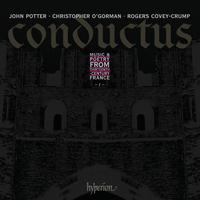 Hyperion,
who have already added considerably to the availability of medieval
music on record, from Gothic Voices and others, now put us even
more in their debt by offering what promises to be the first
volume of conductus. To explain what conductus
was and how it foreshadowed the more familiar polyphony would
take most of this Roundup; it’s best that I refer you to
Mark Everist’s notes on the homepage for this recording
– follow the link above.
Hyperion,
who have already added considerably to the availability of medieval
music on record, from Gothic Voices and others, now put us even
more in their debt by offering what promises to be the first
volume of conductus. To explain what conductus
was and how it foreshadowed the more familiar polyphony would
take most of this Roundup; it’s best that I refer you to
Mark Everist’s notes on the homepage for this recording
– follow the link above.
I should say that conductus is not likely to appeal to as many
listeners as the early polyphony of Pérotin, so it might
be wise to try track 15, Heu quo progreditur, on the
free September 2012 sampler, HYP201209 – here
– before purchase. Even the predominantly black cover may
be off-putting for many, but those who like what they hear on
the sampler will find scholarly and assured performances, well
recorded and with those notes by Mark Everist to which I’ve
referred in the booklet, together with the texts and translations;
in short, all is well up to Hyperion standards.
Adriaen WILLAERT (c. 1490-1562)
Vespro della Beata Vergine (Vespers of the Virgin Mary,
1550, pub. 1555)
Joris Verdin (organ) – rec. March 2012. DDD
Capilla Flamenca (Rob Cuppens, Marnix De Cat (counter-tenors);
Jan Caals, Tore Denys, Govaart Haché, Laurens Wyns (tenors);
Lieven Termont (baritone); Dirk Snellings (bass))/Dirk Snellings
– rec. February 2012. DDD.
Pdf booklet with Latin texts included
RICERCAR RIC325 [79:28] – from classicsonline.com
(mp3)
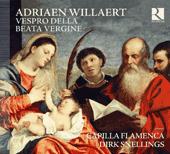 I’m
amazed how many unjustly neglected composers are receiving their
due in the form of fine recordings even in this time of austerity.
Renaissance composers are no exception – two new recordings
of Jean Mouton within a few months – and Adriaen Willaert
is among them, hitherto represented in the current catalogue
only by one recording devoted (almost) entirely to his music:
Cinquecento on Hyperion CDA67749 – July 2010 Roundup.
I’m
amazed how many unjustly neglected composers are receiving their
due in the form of fine recordings even in this time of austerity.
Renaissance composers are no exception – two new recordings
of Jean Mouton within a few months – and Adriaen Willaert
is among them, hitherto represented in the current catalogue
only by one recording devoted (almost) entirely to his music:
Cinquecento on Hyperion CDA67749 – July 2010 Roundup.
Capilla Flamenca have given us some fine performances of Flemish
composers – I’m thinking especially of their recording
of the music of Agricola on RIC306: see March 2011 Roundup
and my overview of the Ricercar catalogue, February 2012/2 Roundup
– and this assemblage of Willaert’s music for Vespers
of the Virgin Mary is no exception. Organ pieces by Willaert’s
contemporaries, played on an instrument whose provenance dates
back to 1471, are interspersed with the vocal items. In a less
competitive month I might well have been considering this for
Download of the Month.
The vocal and instrumental items were recorded at different
times and in different localities, but the variation of acoustic
is not readily apparent. In all respects the mp3 sound is fine
and the inclusion of the booklet with texts is welcome –
there are no translations, but those of the psalms and Magnificat
are not hard to come by.
Fantasticus: Baroque chamber works
Alessandro STRADELLA (1639-1682)
Sinfonia No. 22 in d minor [7:71]
Dieterich BUXTEHUDE (c. 1637-1707)
Sonata a 2 in a minor, BuxWV272 [7:42]
Giovanni Antonio Pandolfi MEALLI (c.
1629-c. 1679) Sonata ‘La Castella’ [6:47]
Johann Heinrich SCHMELZER (c.
1620/23-1680) Sonata a 2 in a minor [6:00]
attr. Augustinus KERTZINGER
(d. 1678) Sonatina in d minor [4:50]
Antonio BERTALI (1605-1669)
Sonata a 2 in d minor [6:45]
Georg MUFFAT (1653-1704) Passacaglia
in g minor (from Apparatus musico-organisticus (1690))
[7:45]
Dietrich BUXTEHUDE Sonata
and Suite in B flat, BuxWV273 [13:50]
John JENKINS (1592-1678)
Fantasia in d minor [4:50]
Fantasticus (Rie Kimura (baroque violin), Robert Smith (viola
da gamba & baroque cello), Guillermo Brachetta (harpsichord)
– rec. April 2012.
Pdf booklet included
RESONUS CLASSICS RES10112 [66:38] – no CD; download
only from resonusclassics.com
(mp3, and lossless)
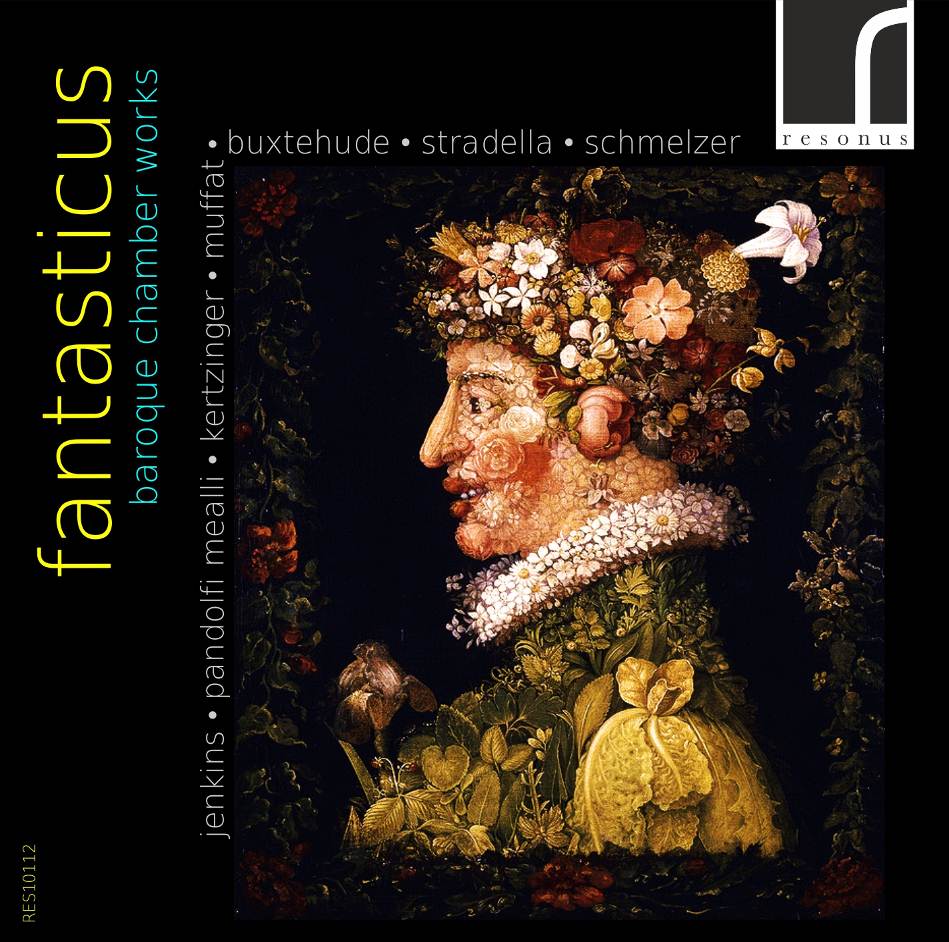 What
a huge variety of music Resonus have brought us on their first
twelve releases in just one year, from baroque to contemporary
and plugging several gaps in the catalogue on the way. Their
new release features debut recordings from the Amsterdam-based
group Fantasticus, their name adopted from the so-called fantastic
style of seventeenth-century music. The recording covers similar
ground to a Naïve recording which Geoff Molyneux and I
recently reviewed (OP30531 – see review),
entitled ‘1600’ but whereas that was limited to Italian
instrumental repertoire of the period, Fantasticus have concentrated
on Austro-German composers, most of them, apart from Buxtehude,
not well known. The two Buxtehude sonatas are available in good
recordings from Challenge Classics (CC72251) and Naxos
(8.557250). Of the music of Augustinus Kertzinger, however
– whom I hadn’t heard of before – there seems
to be just one other work in the catalogue, a sonata for trumpets,
trombones, strings and continuo. I can’t pretend that the
d minor sonatina attributed to him which we hear on this recording
is a major discovery, but it is an exuberant, virtuoso and inventive
work.
What
a huge variety of music Resonus have brought us on their first
twelve releases in just one year, from baroque to contemporary
and plugging several gaps in the catalogue on the way. Their
new release features debut recordings from the Amsterdam-based
group Fantasticus, their name adopted from the so-called fantastic
style of seventeenth-century music. The recording covers similar
ground to a Naïve recording which Geoff Molyneux and I
recently reviewed (OP30531 – see review),
entitled ‘1600’ but whereas that was limited to Italian
instrumental repertoire of the period, Fantasticus have concentrated
on Austro-German composers, most of them, apart from Buxtehude,
not well known. The two Buxtehude sonatas are available in good
recordings from Challenge Classics (CC72251) and Naxos
(8.557250). Of the music of Augustinus Kertzinger, however
– whom I hadn’t heard of before – there seems
to be just one other work in the catalogue, a sonata for trumpets,
trombones, strings and continuo. I can’t pretend that the
d minor sonatina attributed to him which we hear on this recording
is a major discovery, but it is an exuberant, virtuoso and inventive
work.
There’s just one Italian here, Pandolfi Mealli, and he
was an expatriate working in Innsbruck, c.1660. Setting aside
national stereotypes, the music of these composers is somewhat
more ‘solid’ than that of their Italian contemporaries
but that doesn’t mean that it’s boring, especially
as presented here. Lovers of baroque instrumental music are
well served and others may well start here. The cover shot –
one of those Arcimboldo paintings of fantastic human faces made
up of fruit and veg – is a good indication of what you’ll
find on this album. The performances are assured, matching the
style of the music and the recording is excellent – I sampled
the 16-bit version (£9.99); aac and mp3 are £7.99.
I also received a 24-bit review version which I imagine will
be more widely available later – perhaps from eclassical.com,
who offer 24-bit versions of some of Resonus’ earlier recordings.
The recording is rounded off with a colourful booklet containing
a scholarly but readable survey of the development of the fantastic
style in instrumental music in the seventeenth century.
Heinrich SCHÜTZ (1585-1672)
Geistliche Chormusik, SWV369-397 (Sacred Choral Music,
Op.11) (1648) [101:04]
Die sieben Worte Jesu Christi am Kreuz, SWV478 (The Seven
Words from the Cross) [19:20]
Bach Collegium Japan/Masaaki Suzuki – rec. 1997. DDD
Pdf booklet with texts and translations included
BIS-CD-831/832 [66:06 + 55:37] – from eclassical.com
(mp3 and lossless)
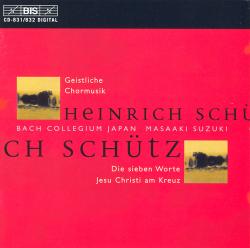 Regular
readers will be aware of my high regard for both the music of
Heinrich Schütz and the performances of the Bach Collegium
and Masaaki Suzuki, here brought together in one of their earliest
recordings for BIS, predating even their Bach Cantata series.
Regular
readers will be aware of my high regard for both the music of
Heinrich Schütz and the performances of the Bach Collegium
and Masaaki Suzuki, here brought together in one of their earliest
recordings for BIS, predating even their Bach Cantata series.
The Geistliche Chormusik is far less austere than much
of Schütz’s music. By 1648 the devastating Thirty
Years War was finally over; larger forces were at the composer’s
disposal than he had had for the Kleine Geistliche Konzerte
and the luxurious employment of them seemed appropriate; they
receive the luxury treatment here. I haven’t heard rival
recordings on Carus (83.232), Berlin Classics (0021092BC)
and Capriccio (C10858), but I very much doubt that they
rival Suzuki’s performers, let alone excel them. Mark Sealy
– review
– and Johann van Veen – review
– have both given thumbs up to the Carus, but it’s
short value by comparison with the BIS – no Sieben letzte
Worte, a valuable bonus from BIS.
The recording is excellent, especially in the lossless version,
albeit that ‘only’ 16-bit is available, for the same
price as mp3. The notes in the booklet are detailed and scholarly
but readable. Only the rather garish cover seems out of place.
At the time of writing this was offered alongside the latest
album in the Bach Cantata series – the Bach with 24-bit
at the same price as 16-bit and mp3, the Schütz at a 30%
discount. As with Hyperion’s ‘please buy me’
bargains, it’s impossible in a bi-monthly series of Roundups
to keep up with short-term offers, though I did highlight this
one in the September 2012/1 Roundup. Keep watching eclassical.com
and hyperion-records.co.uk on a regular basis.
The Dacapo recording offers a very good alternative version
of the Words from the Cross together with the St John
Passion. While the latter is less spare than the St Matthew
Passion, it shouldn’t be imagined that it is in anything
like the operatic style of the Bach passions or even of Telemann’s.
In many respects it’s little different in style from Richard
Davy’s setting which I featured last month as part of the
new Naxos recording of music from the Eton Choirbook. It’s
unfortunate that it’s necessary to duplicate the Words
from the Cross in order to obtain both the BIS and Dacapo recordings,
though that’s less of a problem than might appear, since
they are effectively a bonus on BIS, with other recordings offering
just the Geistliche Chormusik.
Johann Sebastian BACH (1685-1750)
Cantatas Volume 51
Cantata BWV195: Dem Gerechten muss das Licht (1748 or
1749) [18:49]
Cantata BWV192: Nun danket alle Gott (1730 or 1731) [11:00]
Cantata BWV157: Ich lasse dich nicht, du segnest mich denn
(1727) [19:42]
Cantata BWV120a: Herr Gott, Beherrscher aller Dinge (1729)
[30:37]
Hana Blažíková (soprano), Damien Guillon
(counter-tenor), Christoph Genz (tenor), Peter Kooij (bass)
Bach Collegium Japan/Masaaki Suzuki – rec. DDD/DSD
BIS-SACD-1961 [80:88] – from eclassical.com
(mp3, 16– and 24-bit lossless)
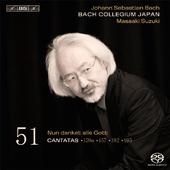 This
latest recording in the series will be released on SACD from
1 October 2012 but will have been available for over a month
as a download by that date. For some of that time the 24-bit
has been available for the same advantageous price as the mp3
and 16-bit.
This
latest recording in the series will be released on SACD from
1 October 2012 but will have been available for over a month
as a download by that date. For some of that time the 24-bit
has been available for the same advantageous price as the mp3
and 16-bit.
All the music here was composed as a result of commissions which
served to boost Bach’s income, but don’t let that
make you think that it’s in any way inferior – after
all, the Brandenburg Concertos were commercial; they got their
name because they were presented to the Marquis of that name
as a calling card from a composer seeking employment. Nor need
we be worried that BWV157 exists only in a manuscript written
after Bach’s death by Christian Friedrich Penzel, the first
part of what was originally a bi-partite cantata which has required
some editing to restore its original form.
BW120a, adapted for a wedding from what was originally for a
council election, has also required some reconstruction; you’ll
find the details in the excellent booklet of notes – another
reason for obtaining the download from eclasscal.com rather
than elsewhere. (Classicsonline.com also have the booklet, but
not the lossless versions.)
I almost forgot to mention the performances and recording quality
– we’ve come to expect near perfection in both from
this source and the same is true again. And if you’re thinking
never mind the quality, feel the width, look at the generous
playing time of 80:88, the only problem with which is that it’s
too long to burn to one CD-R (limit 79:47) except in mp3 format.
Ludwig van BEETHOVEN (1770-1827)
Große Fuge, Op.133 (orchestral version) [19:09]
Berlin Philharmonic Orchestra/Wilhelm Furtwängler –
rec. live 1952. ADD/mono
BEULAH EXTRA 2BX31 [19:09] – from eavb.co.uk
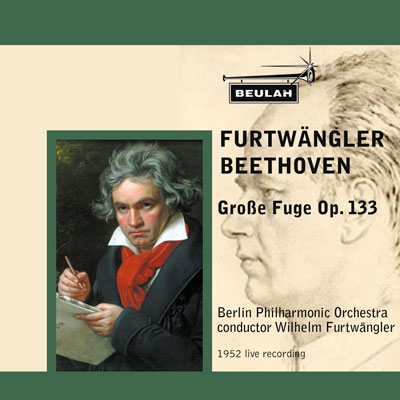 The
Große Fuge was the original final movement of the
String Quartet, Op.130; deemed too long, it was replaced and
preserved with a separate opus number. It used to be fashionable
to perform it in a version for string orchestra, the best-known
recording of which was made by Otto Klemperer; it was coupled
on CD with his stereo version of the Eroica Symphony
but is now available only from Testament (SBT1405, with
Symphonies nos. 1 and 8). The coupling with the Eroica
is not easy to come by even as a download but classicsonline.com
can oblige – here
– or stream from Naxos Music Library.
The
Große Fuge was the original final movement of the
String Quartet, Op.130; deemed too long, it was replaced and
preserved with a separate opus number. It used to be fashionable
to perform it in a version for string orchestra, the best-known
recording of which was made by Otto Klemperer; it was coupled
on CD with his stereo version of the Eroica Symphony
but is now available only from Testament (SBT1405, with
Symphonies nos. 1 and 8). The coupling with the Eroica
is not easy to come by even as a download but classicsonline.com
can oblige – here
– or stream from Naxos Music Library.
This Furtwängler recording was made live in 1952 and I
fear that it sounds its age; though there is little or no surface
noise in the Beulah transfer the tone is scratchy. As for the
performance, it has been described as shaped with loving care
but one person’s loving care is another’s extreme
slowness. Klemperer, too, is slow – the former whizz-kid
had slowed down considerably by 1961 – but not so extremely;
it’s his version that I’d go for. You may, however,
be a greater fan of Furtwängler’s Beethoven than I
and it will cost you only £0.75 to find out.
Robert SCHUMANN (1810-1856)
Complete Works for Violin and Orchestra
Concerto in a minor for violin and orchestra, after the Concerto
in a minor for cello and orchestra, Op.129 (1850: Violin version
by the composer) [22:31]
Fantasy in C for violin and orchestra, Op. 131 (1853) [16:20]
Concerto in d minor for violin and orchestra (1853) [32:22]
Ulf Wallin (violin); Robert-Schumann-Philharmonie/Frank Beermann
– rec.2009. DDD/DSD
Pdf booklet of notes included
BIS BIS-SACD-1775 [72:30] – from eclassical.com
(mp3 and 16– and 24-bit lossless)
[first reviewed in September 2011/2 Roundup.
See also review
by Gavin Dixon.]
The Romantic Violin Concerto 13
Violin Concerto in d minor, WoO 23 (1853) [32:12]
Violin Concerto in a minor, Op. 129 (1850, arranged from the
Cello Concerto) [21:43]
Fantasie in C for Violin and Orchestra, Op.131 (1853) [15:29]
Anthony Marwood (violin)
BBC Scottish Symphony Orchestra/Douglas Boyd – rec. November
2011. DDD
Pdf booklet of notes included
HYPERION CDA67847 [69:24] – from hyperion-records.co.uk
(mp3, 16– and 24-bit lossless) [excerpt available on free
sampler HYP201209
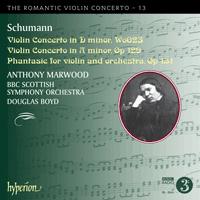
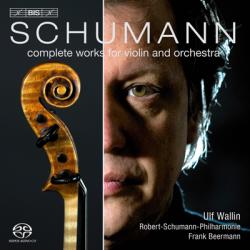 I’ve
long believed that the Schumann Violin Concerto was greatly
underrated and deserved a break, but that has seemed a minority
view until recently. Now, like London buses, three have come
along in short succession, two of which couple the Concerto
in d with the composer’s own arrangement of his Cello Concerto
and the Fantasie in C and both come in 16- and 24-bit
lossless sound as well as mp3. The third version appeared on
Ondine: Chistian Tetzlaff with the Frankfurt Radio SO and Paavo
Järvi, the Violin Concerto in d and the Fantasie
with the Mendelssohn Violin Concerto (ODE1195-2
– download in mp3, with pdf booklet, from classicsonline.com
or in mp3 and lossless, without booklet, from eclassical.com,
or stream from Naxos Music Library). Now the only problem is
to choose between them, which is more easily said than done
because both Anthony Marwood and Ulf Wallin give excellent accounts;
both are very well supported and recorded and both come with
booklet.
I’ve
long believed that the Schumann Violin Concerto was greatly
underrated and deserved a break, but that has seemed a minority
view until recently. Now, like London buses, three have come
along in short succession, two of which couple the Concerto
in d with the composer’s own arrangement of his Cello Concerto
and the Fantasie in C and both come in 16- and 24-bit
lossless sound as well as mp3. The third version appeared on
Ondine: Chistian Tetzlaff with the Frankfurt Radio SO and Paavo
Järvi, the Violin Concerto in d and the Fantasie
with the Mendelssohn Violin Concerto (ODE1195-2
– download in mp3, with pdf booklet, from classicsonline.com
or in mp3 and lossless, without booklet, from eclassical.com,
or stream from Naxos Music Library). Now the only problem is
to choose between them, which is more easily said than done
because both Anthony Marwood and Ulf Wallin give excellent accounts;
both are very well supported and recorded and both come with
booklet.
Tetzlaff and Järvi open proceedings with what looks on
paper like a fast performance of the Fantasie –
noticeably faster than Marwood and Boyd and even more so than
Wallin and Beermann. Whatever the stopwatch says, however, there’s
no sense of haste here and I enjoyed the performance, especially
as it opens proceedings, which is surely preferable to having
it follow a major work. Both rival performances are good, too,
but you may well prefer to rearrange the order to place this
short piece first, as Ondine do.
Subscribers to the Naxos Music Library can compare the Ondine
and BIS recordings there and Hyperion offer the complete third
movement of the Schumann Violin Concerto on their free sampler
(see above).
Where the Ondine recording of the Fantasie is faster
than its two rivals, and the same is true to a lesser extent
in the first two movements of the Schumann Violin Concerto,
Tetzlaff and Järvi take a more expansive view of the finale
– 9:19 against 7:27 (Hyperion) – while the BIS performers
take longer still: 10:30. The question is which half of the
direction to emphasise – lebhaft doch nicht schnell.
Heard immediately after the Ondine recording, the BIS version
does sound rather deliberate, but if you put the comparison
out of mind, the extra degree of lyricism compensates for the
slight decrease in drive. All three versions have their merits
but ultimately I’d plump for the new Hyperion version –
it’s the fastest of the three in this movement and faster
than Joshua Bell (below) but there’s no sense of a scramble.
Overall, it’s a close one to call – depending on your
preferred coupling, you’re unlikely to be disappointed
– but I think Marwood and Boyd just have the edge.
The Cello Concerto sounds well in its new guise for violin –
almost as if it were a different work – and it’s well
performed in both BIS and Hyperion versions. If you choose the
Ondine recording, you won’t be disappointed by the Mendelssohn
coupling – don’t be put off by the cover shot of Tetzlaff
with peeling paintwork behind him; there’s nothing tatty
about the performances – but you may well have more than
one version of this already, in one or more of the common couplings
with Bruch and Tchaikovsky.
Other recordings of the Schumann Violin Concerto worth considering:
– Orchestral Music (symphonies and concertos): EMI CLASSICS
6090372 (4 super-bargain CDs) Frank Peter Zimmermann,
etc.: see review
by Rob Barnett (Bargain of the Month) – the
CD set is on offer for less than from classicsonline.com, the
only download that I can find.
– Piano Concerto and Violin Concerto: WARNER APEX 2564-67716-1
(budget CD) Gidon Kremer/Nikolaus Harnoncourt: see review
by Rob Barnett. Also available on a 3-CD set with the Symphonies,
for £9.99 from classicsonline.com
(mp3) WARNER TELDEC 825646992843
– TCHAIKOVSKY, WIENIAWSKI, BRAHMS and SCHUMANN
Violin Concertos: DECCA 475 6703 (2 CDs) Joshua Bell
– download from hmvdigital.com
(mp3)
Camille SAINT-SAËNS (1835-1921)
Piano Concerto No. 2 in g minor, Op. 22 (1868) [22:07]
The Carnival of the Animals – The Swan (1886) (arr. Godowsky)
[2:32]
Maurice RAVEL (1875-1937)
Piano Concerto in G (1929-1931) [20:44]
Prelude in a minor (1913) [1:27]
George GERSHWIN (1887-1959)
Rhapsody in Blue (1924) [14:50]
Love Walked In (1930) [4:00]
Benjamin Grosvenor (piano)
Royal Liverpool Philharmonic Orchestra/James Judd
No downloadable booklet
DECCA 478 3527/UNI029 [66:00] – from linnrecords.com
(mp3, 16-bit lossless & 24/96 Studio Master)
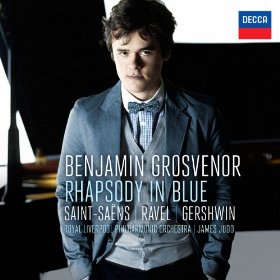 Unless
you’ve been holidaying on Mars you’ll know that this
20-year-old pianist is very hot property indeed. Benjamin Grosvenor,
who won the BBC Young Musician of the Year title in 2004 and
is one of their New Generation Artists, has already given us
one recording that was well received by Brian Wilson (review).
This new release offers a varied programme that, one assumes,
is designed to showcase this young man’s range of talents;
trouble is, this is not a solo album, so one has to factor in
the orchestral contribution as well. And while Vassily Petrenko
has done wonders for the RLPO they’re not on top form here.
Unless
you’ve been holidaying on Mars you’ll know that this
20-year-old pianist is very hot property indeed. Benjamin Grosvenor,
who won the BBC Young Musician of the Year title in 2004 and
is one of their New Generation Artists, has already given us
one recording that was well received by Brian Wilson (review).
This new release offers a varied programme that, one assumes,
is designed to showcase this young man’s range of talents;
trouble is, this is not a solo album, so one has to factor in
the orchestral contribution as well. And while Vassily Petrenko
has done wonders for the RLPO they’re not on top form here.
Grosvenor kicks off with Saint-Saëns’s wayward second
concerto, whose maverick mix of Bachian and rhapsodic elements
makes it a good vehicle for virtuosi. My first impressions of
Grosvenor – I’ve not heard him until now – are
of a strong musical personality well suited to that grandiose
opening. Happily, he’s also at ease in the concerto’s
more reflective moments, striking a good balance between raw
technique and finer feelings. I’m less taken with the recording
– reviewed here in its 24/96 Studio Master form –
which is bright and much too forwardly balanced for my tastes.
It all smacks of a hi-fi presentation that, while initially
arresting, becomes tiresome after a while.
The RLPO aren’t flatteringly caught either, but then the
soloist is the star here. Even in the presence of other stellar
talents, such as Daniil Trifonov, Nobuyuki Tsujii and H J Lim,
Grosvenor is definitely worth your attention. The rhythmic oddities
of the second movement are particularly well handled –
there’s a real sense of mischief here – and he carries
off the finale with aplomb. If only the sound weren’t so
aggressive – orchestral tuttis and keyboard flourishes
are fatiguing – this would be an out-and-out winner. As
a follow-up Grosvenor gives us Godowsky’s arrangement of
The Swan, from Carnival of the Animals. An assured
performance, it’s otherwise unremarkable.
I was keen to hear the Ravel concerto, as it was Grosvenor’s
Gaspard de la nuit that garnered so much praise last
time around. And I wasn’t disappointed; he really does
have a feel for this mercurial music, and his control of phrasing
and dynamics is very impressive indeed. True, his reading may
lack the finer nuances and lasered precision of, say, Zimerman
and Boulez on DG, but it’s still a most persuasive and
engaging performance. That said, the central movement is perhaps
a little unyielding, although the hyperactive finale is despatched
with tremendous brio and bounce.
So not exceptional versions of these concertos, but still a
tantalising glimpse of what lies ahead for this promising young
pianist. Ravel’s Prelude in A minor is a little gem, and
it gets a polished outing here, but it’s Gershwin’s
Rhapsody in Blue that really grabbed my attention. Despite
the piercing, air-raid-siren of a clarinet glissando at the
start, it’s a thrilling performance. Grosvenor is a natural
when it comes to the work’s train-ride rhythms, although
some may find the RLPO’s exuberance bubbles over into brashness
at times. But then this is Gershwin, so that’s hardly a
deal-breaker. The programme ends with a piano-only version of
Love Walked In, played with a quiet, wistful charm that
seems just right for the piece.
Not an unqualified success then; the recording and rough orchestral
playing are real drawbacks, and the programme is a little odd.
Also, Universal have made no attempt to address the issue of
downloadable booklets which, when one pays a whopping £18
for these Studio Masters, is just unforgivable. In fact, given
the disappointing sonics of this SM – superior sound is
the raison d’être of such expensive downloads
– I’d suggest buyers go for the cheaper mp3s or 16-bit
lossless files instead.
Generally fine playing; the Gershwin fares best.
Dan Morgan
http://twitter.com/mahlerei
Pyotr Ilyich TCHAIKOVSKY (1840-1893)
Symphony No. 6 in B minor, ‘Pathétique’, Op.
74 (1893) [42:49]
Romeo and Juliet – Fantasy overture (1869/70/80) [18:45]
Swedish Chamber Orchestra, Örebro/Thomas Dausgaard
rec. September 2011, Örebro Concert Hall, Sweden. DDD/DSD
pdf booklet included
BIS-SACD-1959 [62:21] – from eclassical.com
(mp3, 16– & 24-bit lossless)
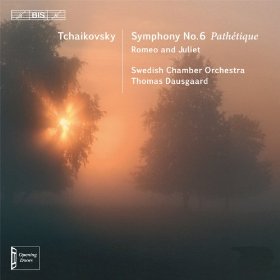 I’m
a great admirer of the Danish conductor Thomas Dausgaard, who’s
given us fine recordings of Nielsen and Langgaard (review);
indeed, I’m working my way through Dacapo’s big box
of the latter’s symphonies and I can assure you it’s
excellent in every way. That said, I was somewhat sceptical
about his decision to tackle Tchaikovsky with chamber forces;
after all, these are both chest-heaving, emotion-draining pieces,
and surely demand a big, surging sound to match. One has to
wary of snap judgments, as I felt exactly the same way before
auditioning the new Symphonie fantastique from Robin
Ticciati and the Scottish Chamber Orchestra; goodness, what
a pleasant shock that was (review).
I’m
a great admirer of the Danish conductor Thomas Dausgaard, who’s
given us fine recordings of Nielsen and Langgaard (review);
indeed, I’m working my way through Dacapo’s big box
of the latter’s symphonies and I can assure you it’s
excellent in every way. That said, I was somewhat sceptical
about his decision to tackle Tchaikovsky with chamber forces;
after all, these are both chest-heaving, emotion-draining pieces,
and surely demand a big, surging sound to match. One has to
wary of snap judgments, as I felt exactly the same way before
auditioning the new Symphonie fantastique from Robin
Ticciati and the Scottish Chamber Orchestra; goodness, what
a pleasant shock that was (review).
One possible benefit of smaller-scale performances is a greater
degree of transparency which, in the case of that astonishing
Berlioz, flung the casement wide and revealed a whole new sound
world. But then that’s the very nature of the piece, its
small, telling touches often masked in big-band performances.
Orchestral Tchaikovsky, though, is about extravagant gestures
and a seamless dramatic line, so can Dausgaard’s pared-down,
‘Opening Doors’ approach – pioneered in Schumann
and Bruckner symphonies – really work here? [It does work
for me in Schumann, with very minor reservations: see review
of BIS-SACD-1519, BIS-SACD-1569 and BIS-SACD-1619
in April 2010 Roundup.
Download these now from eclassical.com in mp3 and lossless.
BW]
Well, the Stygian start to the opening Adagio has never
seemed so hopeless, or the colours so dark. Even at this stage
one feels a lack of propulsion, and the tuttis are somewhat
underpowered. Also, the thick, bass-heavy sound cloaks inner
detail. The Allegro non troppo offers a brief respite
from all this existential angst, but for all that the music
is blighted by dull, dry textures and a sense that it’s
emanating from behind a heavy curtain. The Allegro con grazia
is no better; that deep Tchaikovskian swell is missing,
and it all sounds so grey.
For grey read featureless; the varied topography of this great
piece is just hammered flat, both here and in the Allegro
molto vivace; indeed, I struggled to find any glimmer of
light in this dreary landscape. Even the percussion lacks edge,
drowned out by the odd instrumental and recording balance; that
said, Dausgaard does find a redeeming thrust at movement’s
end. Sadly, it’s too little too late, even if one were
to argue that this slow, louring approach suits the ‘blasted
heath’ that is the Adagio lamentoso. Yes, there
is sorrow here – albeit muted – but I do miss the
nobility and stoicism that needs more amplitude and energy than
it’s afforded here. As for that ghostly tam-tam stroke
it’s very effective, and the music’s underlying pulse
is well conveyed.
After that dispiriting start I hoped the overture would salvage
this brave enterprise. It starts well enough, those dark pizzicato
strings much more clearly articulated than usual. There’s
also more of a dramatic arch here, although it tends to sag
under the weight of this bass-heavy blend. In mitigation there
are some lovely, hushed moments and those ardent tuttis
work better than expected. For all that, momentum is lacking,
and despite a powerful finale this performance simply fails
to convince.
Innovative approaches to core repertoire are always welcome,
as they so often lead to re-evaluation and renewal. That’s
the case with Ticciati’s Berlioz, which overturned all
my preconceptions of how the piece should sound. I so wish I
could say the same about BIS and Dausgaard’s plucky project.
Sometimes less is more; here it really is less.
Dan Morgan
http://twitter.com/mahlerei
Sir Charles Hubert Hastings PARRY
(1848-1918)
Te Deum (1911)* [17:06]
England: John O’Gaunt’s Verse (1918)* [3:31]
The Birds of Aristophanes (1883) Edited for concert performance
by Phillip Brookes) [19:25]
Jerusalem (And did those feet in ancient time) (Original
Version) (1916)* [2:34]
The Glories of Our Blood and State, A Funeral Ode by
James Shirley (1883)* [8:17]
Magnificat (1897) [23:49]
Amanda Roocroft (soprano)
BBC National Chorus of Wales (Adrian Partington, chorus master)
BBC National Orchestra of Wales/Neeme Järvi – rec.
BBC Hoddinott Hall, Cardiff Bay, Cardiff; 17-19 May 2012. DDD.
* premiere recording
Pdf booklet with texts available
CHANDOS CHAN10740 [75:15] – from theclassicalshop.net
(mp3 and lossless)
Job: An oratorio for treble, tenor, baritone and bass
soli, chorus and orchestra
Guildford Choral Society
Royal Philharmonic Orchestra/Hilary Davan Wetton – rec.
1997. DDD.
Pdf booklet with texts included
HYPERION CDA67025 [68:53] – from hyperion-records.co.uk
(mp3 and lossless)
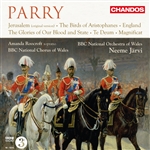
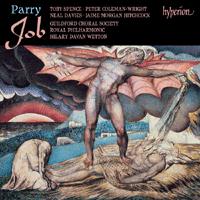 Chandos
and Hyperion have done very well by Parry; I’m including
a new release with several premiere recordings (Chandos) and
one that has fallen by the wayside (Hyperion) this month. Job
is available on CD only from the Special Archive Service, so
the availability of the download is particularly welcome. I’m
publicising it alongside the new Chandos release in the hope
that I can in my own small way encourage readers to take both
up.
Chandos
and Hyperion have done very well by Parry; I’m including
a new release with several premiere recordings (Chandos) and
one that has fallen by the wayside (Hyperion) this month. Job
is available on CD only from the Special Archive Service, so
the availability of the download is particularly welcome. I’m
publicising it alongside the new Chandos release in the hope
that I can in my own small way encourage readers to take both
up.
It seems hard to credit that music of this quality is still
receiving its first recording more than a hundred years on,
but that’s the case with three of the works on Chandos
and the original version of Jerusalem. In the case of
the Coronation Te Deum it’s doubly hard to believe
that it wasn’t discovered even in 1992 when the 1892 Magnificat
and Nunc Dimittis (on the second Hyperion recording,
below) were restored to us. The 1897 Latin Magnificat,
too, is a worthy successor to its English predecessor of 1892.
Full marks, then, to Chandos for their pioneering effort and
for the quality of the performances, recording and presentation.
I had expected to see Sir Andrew Davis’s name on the front
of the booklet and was surprised to see Neeme Järvi’s
instead, forgetting that some of the best ever performances
of English music have been conducted by incomers such as Pierre
Monteux, who gave us such a splendid account of the Enigma
Variations during his time with the LSO.
Job is an oratorio much in the mould of Mendelssohn’s
Elijah but, whereas there’s plenty of drama there,
as when the prophets of Baal are put to the sword, Job
is of necessity a more static work. It’s not that Parry
doesn’t make good use of the dramatic possibilities when
they occur, but his treatment of them is just a little too polite
– don’t expect the vigour of Vaughan Williams’
Job – and I think Hilary Davan Wetton’s direction
is also somewhat to blame; his recording of Vaughan Williams’
Tudor Songs suffers in the same way (CDH55004).
The recording is good, though at low listening levels I sometimes
thought the soloists a little too recessed in balance with the
orchestra unless the volume is turned up a notch or two–
paradoxically, that’s more a problem with the version that
I burned to CD than when I play the music directly from my computer.
These are, however, very minor reservations about a recording
which I have greatly enjoyed hearing.
Two very striking covers and the excellent booklets which they
enclose add to the appeal of these recordings.
When you’ve purchased one or both of these recordings and
decided that Parry’s music is much under-rated, as I hope
you will, you may wish to consider the Chandos complete set
of his symphonies (CHAN9120, also available separately)
which I recommended in the July 2011/2 Roundup.
Then there’s the wonderful Lyrita recording of An English
Suite and Lady Radnor’s Suite on SRCD.220
– see March 2009 Roundup.
Let’s also get that Parry revival rolling, for example
with:
Sir Charles Hubert Hastings PARRY
I was glad [5:44]
Evening Service in D (‘the Great’, 1892, pub. 1992):
Magnificat [8:30]; Nunc dimittis [3:42]
Songs of Farewell [31:20]
Hear My Words, Ye People [15:13]
Jerusalem [2:59]
Roger Judd (organ)
St George’s Chapel Choir, Windsor/Christopher Robinson
– rec. 1987. DDD.
Epub and pdf booklet with texts included.
HYPERION CDA66273 [67:36] – from hyperion-records.co.uk
(mp3 and lossless)
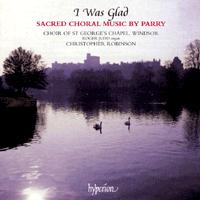 Fortunately
there’s only one work which overlaps with the new Chandos,
Jerusalem, and that’s performed here in the conventional
version whereas Chandos have recorded the original. You won’t
find a much finer recording of the English choral tradition
– Parry coming home to Windsor in a sense, since he had
been a pupil at next-door Eton where he studied under the St
George’s organist – and everything here belies the
image of Parry as a stodgy Victorian.
Fortunately
there’s only one work which overlaps with the new Chandos,
Jerusalem, and that’s performed here in the conventional
version whereas Chandos have recorded the original. You won’t
find a much finer recording of the English choral tradition
– Parry coming home to Windsor in a sense, since he had
been a pupil at next-door Eton where he studied under the St
George’s organist – and everything here belies the
image of Parry as a stodgy Victorian.
Sir Charles Hubert Hastings PARRY
Nonet in B-flat [23:27]
Sir Charles Villiers STANFORD
(1852-1924)
Serenade in F ‘Nonet’ [28:41]
Capricorn – rec.1987. DDD
Epub and pdf booklet included.
HYPERION CDA66291 or CDH55061 [52:38] – from
hyperion-records.co.uk
(mp3 and lossless)
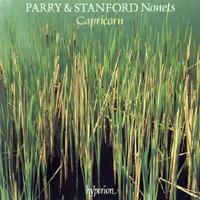 Regrettably
the CDA version is available on CD only to special order and
the budget-price CDH version is deleted, but both are available
for just £5.99 as downloads – the same files, I presume,
whichever you choose and certainly the same enjoyable music
in fine performances, well recorded.
Regrettably
the CDA version is available on CD only to special order and
the budget-price CDH version is deleted, but both are available
for just £5.99 as downloads – the same files, I presume,
whichever you choose and certainly the same enjoyable music
in fine performances, well recorded.
For other music by Stanford, another composer whose cause needs
to be advanced, please refer to the September 2010 Roundup,
July 2011/1 Roundup
and August 2011/2 Roundup.
For the Resonus recording of Stanford’s organ music (RES10104,
Tom Winpenny) see the June 2011/1 Roundup.
John Philips SOUSA (1854-1932)
Ancient and Honorable Artillery Company [2:21]
The Black Horse Troop [3:14]
Golden Jubilee [3:20]
Manhattan Beach [2:05]
The National Game [2:51]
New Mexico [2:54]
Sesqui-centennial Exposition [3:17]
The Glory of the Yankee Army [3:20]
The Gridiron Club [3:18]
The Kansas Wildcats [2:37]
The Pride of the Wolverine [3:34]
The Rifle Regiment [3:15]
Eastman Wind Ensemble/Frederick Fennell – rec. 1961. ADD/stereo
BEULAH EXTRA 15-26 BX182 [36:09: all available separately]
– from eavb.co.uk
(mp3)
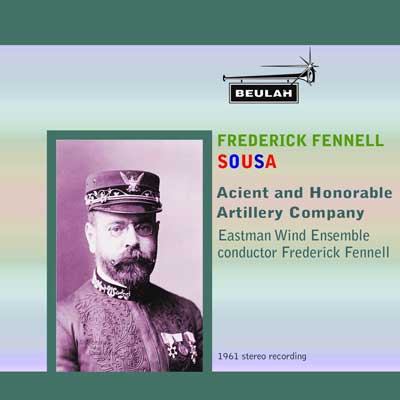 British
orchestras have made successful recordings of the music of Sousa,
though none seem to be currently available, but his very name
is cognate with America – his Portuguese father supposedly
altered the spelling of the family name so that it ended with
the letters USA – and most of all with these lively and
classic recordings under the direction of Frederick Fennell.
Beulah have already released a number of Fennell’s recordings
of Sousa – see December 2011/1 Roundup
– and the new releases are equally welcome. As before,
the recordings have come up well. Some of these recordings are
available on a Mercury CD but that seems to be hard to find
in the UK. Indeed, there’s very little by Sousa in the
current UK catalogue, so Beulah is the place to go and, at £0.50
each, these reissues are very good value.
British
orchestras have made successful recordings of the music of Sousa,
though none seem to be currently available, but his very name
is cognate with America – his Portuguese father supposedly
altered the spelling of the family name so that it ended with
the letters USA – and most of all with these lively and
classic recordings under the direction of Frederick Fennell.
Beulah have already released a number of Fennell’s recordings
of Sousa – see December 2011/1 Roundup
– and the new releases are equally welcome. As before,
the recordings have come up well. Some of these recordings are
available on a Mercury CD but that seems to be hard to find
in the UK. Indeed, there’s very little by Sousa in the
current UK catalogue, so Beulah is the place to go and, at £0.50
each, these reissues are very good value.
Sergei RACHMANINOV (1873-1943)
Piano Concerto No.1 in f-sharp minor, Op.1. Revised version
(1891/1917) [28:44]
Piano Concerto No.4 in g minor, Op.40. Final version (1926/41)
[27:04]
Rhapsody on a Theme of Paganini, Op.43 [24:48]
Noriko Ogawa (piano)
Malmö Symphony Orchestra/Owain Arwel Hughes – rec.
June and November1998 and June 2001. DDD.
Pdf booklet included
BIS-CD-975 [81:30] – from eclassical.com
(mp3, 16– and 24-bit lossless)
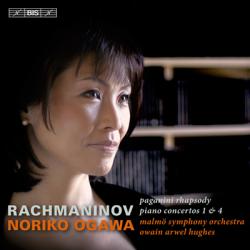 These
recordings were made some considerable time ago, soon after
those of Piano Concertos Nos. 2 and 3 (BIS-CD-900) and
the catalogue number suggests that it was slated for release
at about the same time. That recording received a bit of a rough
ride from the reviewers – slated in a different, Beckmesser
sense of the word – which may account for the fact that
its successor has only now been released. In the meantime BIS
have treated us to Yevgeny Sudbin’s very fine account of
the Fourth Concerto, coupled with Medtner’s Second (BIS-SACD-1728
– see ‘In Brief’, February 2010 Roundup:
download from eclassical.com
in mp3 and lossless).
These
recordings were made some considerable time ago, soon after
those of Piano Concertos Nos. 2 and 3 (BIS-CD-900) and
the catalogue number suggests that it was slated for release
at about the same time. That recording received a bit of a rough
ride from the reviewers – slated in a different, Beckmesser
sense of the word – which may account for the fact that
its successor has only now been released. In the meantime BIS
have treated us to Yevgeny Sudbin’s very fine account of
the Fourth Concerto, coupled with Medtner’s Second (BIS-SACD-1728
– see ‘In Brief’, February 2010 Roundup:
download from eclassical.com
in mp3 and lossless).
I haven’t heard Noriko Ogawa’s recording of the two
popular concertos, but competition is much less fierce in Nos.
1 and 4 and she makes a good case for these two works. I’m
not entirely sold by her performance of No.1, but that’s
Rachmaninov’s fault rather than hers – I’m not
even totally convinced by the award-winning Hyperion recording
from Dallas with Stephen Hough and Andrew Litton (CDA67501/2
– December 2011/2 Roundup).
No.4, on the other hand, though it takes a bit longer to love
than its two predecessors, is an unjustly neglected work. The
delicacy of Ogawa’s playing in French repertoire has been
much praised and it works well with Rachmaninov, too, especially
given the sympathetic support which she receives.
I can’t make a direct comparison between Ogawa and Sudbin
in No.4 because she gives us the 1941 final version, published
by Charles Foley, and he the original 1926, published by Boosey
& Hawkes. Both are very good and choice may safely be left
to preference of coupling; the Medtner concerto is well worth
getting to know, but the Paganini Rhapsody which concludes
the Ogawa recording is very tempting, bringing the playing time
to over 81 minutes. That’s a bonus, but also a problem
if you want to burn the music to CDR, something which you’ll
be able to do only if you burn the mp3 version as an mp3 disc,
in which case you’ll have to cope with minute gaps between
variations in the Rhapsody. (See below for the mp3 CD
of Gershwin and Rachmaninov which I burned for in-car use.)
The original recording was made in 20-bit format, but it’s
still worth paying that little extra for the excellent 24-bit
download.
Top recommendation for all four concertos and Rhapsody
still lies with Hyperion; copyright prevents that from being
offered as a download but it’s available at mid price on
disc. If, for any reason, that doesn’t appeal, there’s
Earl Wild and Jascha Horenstein on two CDs, originally recorded
for Reader’s Digest and now on Chandos CHAN7114.
You’ll find my thoughts on both of those sets in the December
2011/2 Roundup.
If it’s just Nos. 1, 4 and the Rhapsody that you want,
however – perhaps you have Nos. 2 and 3 already –
the new Ogawa recording will do fine, as will Sudbin if you’re
looking for No.4 and the Medtner.
Josef SUK (1874-1935)
Piano Quartet in a minor, Op.1 [22:39]
Four Pieces, Op.17 [16:37]
Piano Quintet in g minor, Op.8 [33:41]
The Nash Ensemble (Marianne Thorsen (violin), Benjamin Nabarro
(violin), Lawrence Power (viola), Paul Watkins (cello), Ian
Brown (piano)) – rec.2003. DDD
Epub and pdf booklet included
HYPERION HELIOS CDH55416 [72:56] – from hyperion-records.co.uk
(mp3, 16– and 24-bit flac)
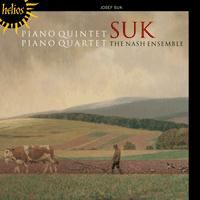 Reviewing
the original release – here
– Jonathan Woolf thought this a valid alternative to the
Supraphon recordings of the Quartet (Suk Trio) and Quintet (Suk
Quartet plus Pavel Štěpan), though he ultimately thought
those Czech performances preferable. Those Supraphon recordings,
coupled with the Piano Trio, are available as a download from
hmvdigital.com, amazon.co.uk and emusic.com, but I haven’t
been able to hear them. I can only say that they must be very
good indeed to be preferred to the Nash Ensemble. The music
is most attractive, if a little on the serious side in places,
the Hyperion recording is excellent and comes in 24-bit sound
as well as mp3 and 16-bit lossless; none of these will break
the bank – even the 24-bit costs only £6.75.
Reviewing
the original release – here
– Jonathan Woolf thought this a valid alternative to the
Supraphon recordings of the Quartet (Suk Trio) and Quintet (Suk
Quartet plus Pavel Štěpan), though he ultimately thought
those Czech performances preferable. Those Supraphon recordings,
coupled with the Piano Trio, are available as a download from
hmvdigital.com, amazon.co.uk and emusic.com, but I haven’t
been able to hear them. I can only say that they must be very
good indeed to be preferred to the Nash Ensemble. The music
is most attractive, if a little on the serious side in places,
the Hyperion recording is excellent and comes in 24-bit sound
as well as mp3 and 16-bit lossless; none of these will break
the bank – even the 24-bit costs only £6.75.
George GERSHWIN (1898-1937)
Piano Concerto in F (1925) [32:54]
Rhapsody in Blue (original jazz band version, orch. Ferde
Grofé, 1924) [16:21]
Second Rhapsody for piano and orchestra (in the original 1931
orchestration by the composer) [15:02]
Variations on ‘I Got Rhythm’ for piano and orchestra
(1934) [8:29]
Freddy Kempf (piano)
Bergen Philharmonic Orchestra/Andrew Litton – rec. August
2011. DDD/DSD
Pdf booklet included
BIS-SACD-1940 [73:56] – from eclassical.com
(mp3, 16– and 24-bit lossless)
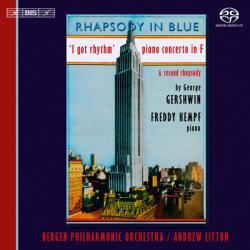 Leonard
Bernstein still takes a lot of beating in this repertoire*,
but there’s a great deal to be said for the new recording,
not least the use of the original versions of the two Rhapsodies,
in the former of which Håkon Nilsen’s schmoozy clarinet
turns Bergen into pre-war New York. Freddy Kempf and Andrew
Litton don’t quite erase memories of Bernstein but they
come pretty close and they do so on an album which conveniently
couples all four concertante works.
Leonard
Bernstein still takes a lot of beating in this repertoire*,
but there’s a great deal to be said for the new recording,
not least the use of the original versions of the two Rhapsodies,
in the former of which Håkon Nilsen’s schmoozy clarinet
turns Bergen into pre-war New York. Freddy Kempf and Andrew
Litton don’t quite erase memories of Bernstein but they
come pretty close and they do so on an album which conveniently
couples all four concertante works.
I sometimes think that the Piano Concerto tries too hard to
be ‘classical’ and that impression is heightened by
the slightly tentative beginning of this performance, but matters
soon improve greatly and all is long forgiven by the time that
we reach the end of the prestidigitation of the I Got Rhythm
variations at the end of the programme. The recording is excellent
– even in the mp3 version which I burned to play in the
car, alongside two other BIS releases, the new Rachmaninov Concertos
from Noriko Ogawa and the slightly older Yevgeny Sudbin of Rachmaninov
and Medtner concertos; over three hours of sustenance for a
long journey and still room to spare on one CDR. Remember that
with eclassical.com, as with theclassicalshop.net, you can download
the very good lossless flac version – either the 16–
or 24-bit – and return for the mp3 later.
On the face of it, the recent Naxos recording of three of these
works by Orion Weiss and JoAnn Falletta with the Buffalo PO
offers a splendid bargain (8.559705). There’s nothing
at all amiss with the performances but I could give only a limited
recommendation in the April 2012/1 Roundup
because of the short playing time, without the Rhapsody in
Blue. That recording comes from classicsonline.com for £4.99,
which is fine if you already have a version of the Rhapsody
and need only mp3, but the eclassical.com price of $11.09 for
an extra 16 minutes means that you can have both mp3 and 16-bit
lossless for not much more. (The 24-bit costs a little extra.)
Bargain-hunters may be interested in a budget-price Regis CD
which I reviewed in the May 2012/1 Roundup:
Eugene List and Howard Hanson in the Rhapsody in Blue and
Piano Concerto, with Antal Doráti conducting An American
in Paris (RRC1386 – buy the CD for around £5
or download from classicsonline.com;
downloads from other sources may be more expensive).
* American in Paris, Piano Concerto and Rhapsody in
Blue, Sony Great Performances 82876787682. Download
American and Rhapsody from hmvdigital.com
for just £1.98 or from sainsburysentertainment.co.uk,
with Bernstein Symphonic Dances from West Side Story
for £3.99, both in 320 kb/s mp3.
Allan PETTERSSON (1911-1980)
Symphony No. 1 – Performing edition by Christian Lindberg
from the original, incomplete score (1951– ) [30:11]
Symphony No. 2 (1952-1953) [46:45]
Norrköping Symphony Orchestra/Christian Lindberg
rec. May-June 2010, Louis de Geer Concert Hall, Norrköping,
Sweden
BIS-CD-1860 [77:54] – from eclassical.com
(mp3, 16- & 24-bit lossless)
Symphony No. 6 (1963-1966) [59:18]
Norrköping Symphony Orchestra/Christian Lindberg
rec. January 2012, Louis de Geer Concert Hall, Norrköping,
Sweden
BIS-SACD-1980 [59:18] – from eclassical.com
(mp3, 16- & 24-bit lossless)
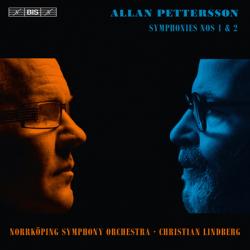
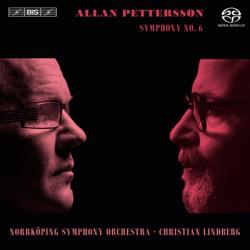 At
the time of writing – early September – eclassical
were offering both downloads as a cut-price package; buy the
newest recording – Symphony No. 6 – and get a 30%
discount on Symphonies 1 and 2. To sweeten the deal even more,
the 24-bit flacs are offered at the same price as the mp3s and
16-bit files, albeit for a limited period. It’s a shrewd
strategy, aimed at getting more listeners to experiment with
high-res audio. As one converted to the cause some time ago,
I reckon it makes good sense, but with one proviso: not all
these 24-bit files are high-res originals, a fact stated clearly
on the website. Is that an issue? It shouldn’t be; I’ve
heard a number of these BIS releases and the difference between
44.1kHz and 96kHz originals is not significant. And for that
I’m sure to be pilloried by those on the fringes of Audio-la-la
Land.
At
the time of writing – early September – eclassical
were offering both downloads as a cut-price package; buy the
newest recording – Symphony No. 6 – and get a 30%
discount on Symphonies 1 and 2. To sweeten the deal even more,
the 24-bit flacs are offered at the same price as the mp3s and
16-bit files, albeit for a limited period. It’s a shrewd
strategy, aimed at getting more listeners to experiment with
high-res audio. As one converted to the cause some time ago,
I reckon it makes good sense, but with one proviso: not all
these 24-bit files are high-res originals, a fact stated clearly
on the website. Is that an issue? It shouldn’t be; I’ve
heard a number of these BIS releases and the difference between
44.1kHz and 96kHz originals is not significant. And for that
I’m sure to be pilloried by those on the fringes of Audio-la-la
Land.
Sound quality is but one consideration, and matters much less
when the performances are something special; occasionally, as
in the Dausgaard Tchaikovsky, neither is up to snuff. Thankfully,
that’s rare and, where possible, I always choose the 24-bit
flacs for review or private purchase. One only has to hear the
improvements in those vintage Decca, Philips and DG downloads
– available from Linn – to be persuaded that these
issues are worth the extra moolah. In BIS’s case, prices
are much lower, which makes the switch to high-res even more
attractive.
BIS have recorded many of Pettersson’s symphonies, including
his late breakthrough, the Seventh (1966-1967). It’s unusual
for a composer to achieve success so late in his life, but then
this intense soul had plenty to contend with, not least the
arthritis that plagued him for the last 30 years of his life.
In his exhaustive liner-notes Michael Kube describes the incomplete
score of Pettersson’s First Symphony as an ‘extensive
torso’, although reading further it becomes clear that
creating a performing version of the work was far from easy.
Undaunted, trombonist and conductor Christian Lindberg took
on the task, leading to this world-premiere recording.
As with many of Pettersson’s symphonies this one is set
in a single movement; and while it’s essentially tonal
there’s a degree of rigour and a density of specification
that makes for a highly individual work and an absorbing listen.
Certainly, those expecting an uncompromising piece will be pleasantly
surprised by the vein of lyricism here; even more appealing
is the richness and variety of Pettersson’s colour palette,
details of which are well caught in this clear and dynamic recording.
In fact, it’s very hard to believe this is a humble Red
Book original, which just proves the point I made earlier.
Newbies will find much to enjoy in this symphony, whose narrative
strength and level of incident is never less than compelling.
No comparatives spring easily to mind – his is a very distinctive
soundscape – which is an advantage in that one can listen
free of preconceptions. The Second Symphony is no less engaging
and pliable; textures are perhaps leaner – there’s
some piquant writing for brass that reminded me of Bartók’s
Bluebeard – and dynamic contrasts are much stronger.
That said, there are passages of startling beauty and undoubted
feeling, played with great refinement and a sure sense of the
work’s evolving architecture. Even those outbursts –
just listen to the rumble of bass drum and fizz of cymbals –
seem proportionate and not in the least rhetorical.
The Second Symphony is remarkably assured, and it benefits in
no small measure from an exceptional recording. If you’re
reluctant to splash out on the entire album – the First
is perhaps more of a sketch, an outline, than a finished picture
– I’d suggest downloading the Second as a good example
of the composer’s early work. The Sixth, written over four
years, is even more impressive; daunting in its length –
the single span lasts an hour – colours are vivid and small
details are more subtly realised. There’s less time for
repose here, and a greater sense of disquiet – menace,
even – in those strange tuttis and extended meditations.
Lindberg and his band dig deep, and the BIS engineers respond
with another spacious and quietly spectacular recording. Balances
are entirely natural, and the extremes of dynamic are accommodated
without aggression or loss of focus. There’s a pleasing
three-dimensionality to the sound as well; just listen to how
the lower brass rears out of the mix, and marvel at the sheer
‘presence’ of side drums and tam-tam. As for the music
itself, this eventful hour passes without longueurs;
there’s so much to savour here, not least the thrill of
a fine orchestra in great form.
This deal makes good sense both financially and musically, and
potential buyers can be assured that – despite disappointments
in the past – the highest production values prevail here.
Indeed, this ongoing cycle is every bit as important and desirable
as BIS’s Aho project, so expect more reviews from this
quarter soon.
Fascinating rep, played with rare commitment; fabulous sound.
Dan Morgan
http://twitter.com/mahlerei
Second thoughts
Olivier MESSIAEN (1908-1992)
Turangalîla Symphony
Steven Osborne (piano), Cynthia Millar (ondes Martenot)
Bergen Philharmonic Orchestra/Juanjo Mena – rec. June 2011.
DDD.
epub and pdf booklet included
HYPERION CDA67816 [77:07] – from hyperion-records.co.uk
(mp3 and lossless)
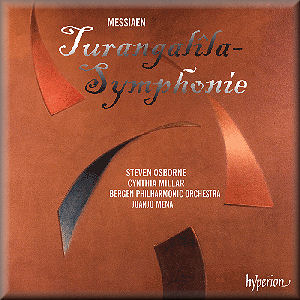 This,
from Geoff Molyneux, is actually a fourth positive opinion –
Dan Morgan and John Quinn have both made it a Recording
of the Month and I was also impressed when I reviewed
it in the August 2012/2 Roundup.
This,
from Geoff Molyneux, is actually a fourth positive opinion –
Dan Morgan and John Quinn have both made it a Recording
of the Month and I was also impressed when I reviewed
it in the August 2012/2 Roundup.
One of the most important works of the 20th century is stunningly
portrayed by Juanjo Mena and his forces on this magnificent
Hyperion recording. The first movement, entitled ‘Introduction’
is given a performance of colossal power and energy together
with playing of great delicacy and refinement in which individual
performers contribute with subtlety and musicality. In comparison,
the performance by Kent Nagano and the Berlin Philharmonic sounds
positively tame in the more ferocious music and in the ‘statue
theme’.
In ‘Chant d’amour 1’ the performers make telling
contrasts between the gorgeous and tender melody for strings
and ondes, beautifully played here, and the rhythmic sometimes
violent outbursts. Sometimes faster sections seem a bit rushed
in Mena’s performance and there is not quite as much clarity
as in Ricardo Chailly’s rendition with the Amsterdam Concertgebouw
Orchestra. Rattle is also somewhat slower than Mena in both
the fast music and the gentle string melody with ondes. All
three control well the various tempi presented in the different
sections and I particularly like Rattle’s performance of
the beautiful slow melody. That said, Mena controls the sudden
changes in tempo and character in this movement so well, and
gives the most energised and well-contrasted performance.
In the third movement, ‘Turangalila 1’ the opening
is beautifully coloured beginning with a clarinet solo and delicate
percussion, soon joined by a pizzicato bass. The recording
has a very wide dynamic range and maybe this opening is slightly
too soft. The pizzicato is barely audible, but it is
perfect on its return at the conclusion of the movement where
solo oboe shares the honours with the clarinet. Chailly takes
a little longer here and this is to the music’s advantage
and the Amsterdam principal clarinet has a tone to die for.
Yan Pascal Tortelier also has a beautiful clarinettist but Tortelier
does not produce the white heat of intensity that Mena achieves
during the more frightening sections.
At the beginning of the fourth movement, ‘Chant d’amour
2’, I love the colour of the bassoon and piccolo in octaves
at the start. This is lively, humorous and staccato, until the
piano and other instruments join in. Previn is so slow in this
passage. In the full orchestra sections in the Hyperion recording
there is a perfect balance, and even in the densest music we
can hear the individual solos and orchestral sections with great
clarity. What superb piano playing from Osborne in this movement!
The various themes are developed and coloured, then suddenly
we hear the supremely gentle flower theme on the clarinets followed
by the statue theme. Everything is superbly controlled by Mena,
especially as we reach the lovely and delicate conclusion.
The fifth movement is fast and fearless and is played with a
great rhythmic verve and colour. This is a real tour de force
of energy and I can hear everything so clearly. There is some
fabulous ondes playing here from Millar. The brilliant and virtuosic
piano cadenza leads into a return of the statue theme concluding
with a massive and climactic crescendo on the final chord. This
is actually quite overwhelming in Mena’s performance. Previn
is almost as impressive in the climax but the Hyperion is more
spacious, whilst Kent Nagano’s recording with the Berlin
Philharmonic is a bit over resonant in the lively first section.
After such exhilaration, we need a long pause before moving
into the sublime music of Movement six. Hyperion give us the
necessary time to adjust before we enter the intoxicating ‘Jardin
du Sommeil d’amour’. This is fabulously played in
the strings and the ondes Martenot with contrasting birdsong
represented in the piano. The delicacy and refinement here is
truly wonderful. A great and moving performance. I also like
André Previn with the London Symphony Orchestra in this
movement; the accompanying instruments are more equally balanced
whereas Steven Osborne on Mena’s performance is a little
too much in the foreground both at the start and when other
instruments join the piano. This is only a minor observation.
The performance is fabulous.
Movement 7, ‘Turangalila 2’ is a nightmarish piece
beginning with a piano cadenza, but an array of percussion soon
begins to dominate. Later we hear the brass chordal statue theme.
I like the clarity of Howard Shelley’s playing on Tortelier’s
recording, but Osborne and Mena provide a more abandoned and
thrilling experience.
In the eighth movement most of the themes and ideas are further
developed. The huge range of colour, texture and volume is superbly
captured by Mena and his forces. The final shattering chord,
which gradually disappears into empty space at the end, is an
astonishing feat of recording. Rattle and the City of Birmingham
Symphony Orchestra also give a stunning performance, but their
rather elderly recording cannot match this new version from
Hyperion.
The ever-increasing complexity of the short Ninth movement,
‘Turangalila 3’ is superbly realised by Mena, and
the finale is a fast, lively and joyous climax to the work.
Mena controls a thrilling crescendo leading to a magnificent,
final statement of the love them from the full orchestra, followed
by a lively conclusion finishing with a fortissimo chord.
There are several fine recordings available including those
by Tortelier, Previn and Rattle, but on balance I would choose
this new recording headed by Juanjo Mena. The performance has
all that one could wish for and Hyperion have done wonders in
capturing the vast range of sound in Messiaen’s huge palette
of musical colour.
Geoffrey Molyneux
***
Ravi SHANKAR
(b.1920) Symphony (2010)
Anoushka Shankar (sitar)
London Philharmonic Orchestra/David Murphy – rec. live,
RFH, July 2010. DDD
Pdf booklet included
LPO LIVE LPO0060 [41:49] – from classicsonline.com
(mp3)
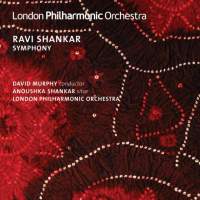 Even
more than Ravi Shankar’s by now well-known sitar concertos
(EMI Gemini 5865552), this is a first-class blend of
Eastern and Western music. I’m not sure if it qualifies
as a symphony, but that shouldn’t spoil your enjoyment;
take it as you find it. With his daughter Anoushka playing the
sitar and Ravi Shankar himself in the Festival Hall audience,
this premiere performance is authoritative and the live recording
is very good. The booklet of explanatory notes comes as part
of the deal, which is valuable.
Even
more than Ravi Shankar’s by now well-known sitar concertos
(EMI Gemini 5865552), this is a first-class blend of
Eastern and Western music. I’m not sure if it qualifies
as a symphony, but that shouldn’t spoil your enjoyment;
take it as you find it. With his daughter Anoushka playing the
sitar and Ravi Shankar himself in the Festival Hall audience,
this premiere performance is authoritative and the live recording
is very good. The booklet of explanatory notes comes as part
of the deal, which is valuable.
42 minutes is hardly a generously playing length, but for once
I won’t complain; what could possibly have been coupled
with the Symphony? It’s one of those inexplicable paradoxes
that you can purchase the CD for less than the download (on
offer for £4.85 from our partners at MDT, normally £5.95,
£5.32 from amazon.co.uk at the time of writing, as against
£7.99 for the download from classicsonline.com.
Antony PITTS (b.1969) Alpha
and Omega
The Peace of Jerusalem [8:15]
Sanctus and Benedictus [3:26]
A Thousand Years [7:50]
My Dove [7:22]
The ‘I Am’ sayings of Jesus [41:06]
Tonus Peregrinus (Joanna Forbes, Rebecca Hickey, Kathryn Knight,
Alexander L’Estrange, Richard Eteson, Alexander Hickey,
Francis Brett, Nick Flower)/Antony Pitts – rec. 2007. DDD.
Pdf booklet and epub included
HYPERION CDA67668 [67:59] – from hyperion-records.co.uk
(mp3 and lossless)
Antony PITTS Seven Letters
Adoro te [3:55]
The Lord’s Prayer [3:58]
The First and Last [2:16]
Seven Letters to the Churches [24:10]
O Love [3:46]
O Wisdom of God – Antiphon for Advent [9:36]
O Holy of Holies – Antiphon for Advent [4:16]
Amen [8:24]
Tonus Peregrinus/Antony Pitts – rec. 2000. DDD.
Pdf booklet and epub included
HYPERION CDA67507 [60:13] – from hyperion-records.co.uk
(mp3 and lossless)
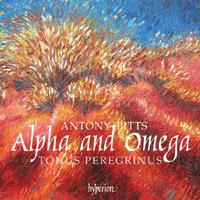
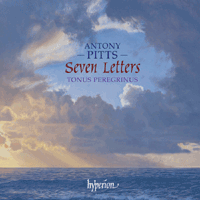 As
director of Tonus Peregrinus, Anthony Pitts clearly has the
music of renaissance composers in his blood and they are a clear
influence on his own music, as also is Arvo Pärt whose
music the group has also performed. (Serenity: the Beauty
of Arvo Pärt, Decca 480 6386, 2 CDs.) It’s
almost as if one of his renaissance predecessors has been miraculously
restored to life, been allowed to catch up with all that has
intervened, and then set pen to paper – except that my
description doesn’t begin to do justice to the individuality
of his music. Jeremy Summerly’s notes, available on the
Hyperion webpage, do it better. The result is not ‘easy’
listening – less immediately approachable than some of
the other contemporary composers that Hyperion have brought
us – but it is absolutely enthralling and there can be
no better take on it than these two recordings from his own
ensemble, both very well recorded and documented in the Hyperion
style. It clearly arises from the composer’s own religious
faith, but you don’t need to share that faith to respond
– after all, it spoke to me as an Anglo-Catholic/Buddhist
agnostic.
As
director of Tonus Peregrinus, Anthony Pitts clearly has the
music of renaissance composers in his blood and they are a clear
influence on his own music, as also is Arvo Pärt whose
music the group has also performed. (Serenity: the Beauty
of Arvo Pärt, Decca 480 6386, 2 CDs.) It’s
almost as if one of his renaissance predecessors has been miraculously
restored to life, been allowed to catch up with all that has
intervened, and then set pen to paper – except that my
description doesn’t begin to do justice to the individuality
of his music. Jeremy Summerly’s notes, available on the
Hyperion webpage, do it better. The result is not ‘easy’
listening – less immediately approachable than some of
the other contemporary composers that Hyperion have brought
us – but it is absolutely enthralling and there can be
no better take on it than these two recordings from his own
ensemble, both very well recorded and documented in the Hyperion
style. It clearly arises from the composer’s own religious
faith, but you don’t need to share that faith to respond
– after all, it spoke to me as an Anglo-Catholic/Buddhist
agnostic.
Reviewing Tonus Peregrinus’s recent release of music from
the Eton Choirbook (Naxos 8.572840 – Bargain
of the Month: August 2012/2 Roundup)
I omitted to mention their recordings of their founder’s
own music and I’m happy to put that right now. Unfortunately
the encomiums (encomia?) which greeted the release on CDA67507,
not least from our own John Quinn – review
– have not saved it from the unloved ‘please buy me
category’ where it was languishing when I downloaded it
– let’s not allow it to descend there again.
We seem not to have reviewed the more recent recording on CDA67668
but it’s equally recommendable. The enthralling opening
work is the coda from Pitts’ Jerusalem-Yerushalayim,
a work still awaiting its premiere recording in full, and one
which I hope someone will be prepared to take up. The received
etymology of the name Jerusalem links it with the Semitic root
s-l-m, peace, and that’s the spirit that breathes
through this work. If you’re still not prepared to go the
whole hog and buy either of these recordings, you’ll find
adoro te, perhaps the most striking work from CDA67507,
on a Hyperion sampler of contemporary choral music, Dreamland
(HYP41– yours to download for just £2.99 –
here).
Work in progress
Loyset COMPÈRE (c1445-1518)
Dictes moy toutes voz pensées [1.50]
Jean MOUTON (before 1459-1522)
Missa Dictes moy toutes voz pensées [38.18]
Quis dabit oculis? (Lament for Anna) [8.35]
Ave Maria … benedicta tu [2.11]
Salva nos, Domine [2.31]
Ave Maria … virgo serena [9.33]
Nesciens mater [4.54]
The Tallis Scholars/Peter Phillips – rec. 2011 (?). DDD.
Pdf booklet with texts and translations included.
GIMELL CDGIM047 [67:54] – from gimell.com
(mp3 and 16– and 24-bit lossless)
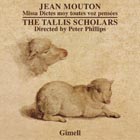 I
plan to say more about this new recording, due for release in
October, in my next Roundup, when I hope to be able to include
some thoughts from Geoff Molyneux to set alongside my own. I
know that John Quinn is also planning to review the physical
product among the main MusicWeb International reviews. As soon
as the download appears, there’s no need to hesitate; my
fuller review will be largely a matter of filling out my very
positive initial thoughts on the music, performance, recording
and presentation. Best of all, only Nesciens mater overlaps
with the fine Mouton recording made by the Brabant Ensemble
for Hyperion and reviewed in the July 2012 Roundup
(CDA57933). Between them these two recordings have increased
the recorded repertoire of Mouton by a factor of almost infinity.
I
plan to say more about this new recording, due for release in
October, in my next Roundup, when I hope to be able to include
some thoughts from Geoff Molyneux to set alongside my own. I
know that John Quinn is also planning to review the physical
product among the main MusicWeb International reviews. As soon
as the download appears, there’s no need to hesitate; my
fuller review will be largely a matter of filling out my very
positive initial thoughts on the music, performance, recording
and presentation. Best of all, only Nesciens mater overlaps
with the fine Mouton recording made by the Brabant Ensemble
for Hyperion and reviewed in the July 2012 Roundup
(CDA57933). Between them these two recordings have increased
the recorded repertoire of Mouton by a factor of almost infinity.















